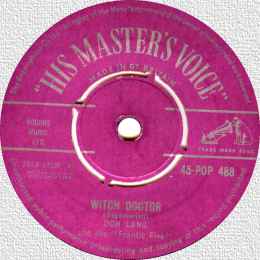
|
1958 | |
| Don Lang- Gordon Langhorn born on 19th January 1925 in Halifax, Yorkshire | ||
|
Don Lang and his 'Frantic Five' were resident musicians on TV's Six-Five Special and were responsible for the theme tune that Don sang to start the show each week. Rock and Roll was an obvious opportunity for Don Lang who would otherwise have been running a Jazz combo. They were in roughly the same mould as Tony Crombie and his Rockets, though perhaps not copying Bill Haley as closely as the latter. The group's TV exposure allowed them to make hits from four covers of American songs. These included 'School Day' and even 'Sink The Bismark' |
||
|
'Witch Doctor' was their greatest success and gave them a #5. The original David Seville version only managed to reach #11. Mercifully, Don Lang and his group did not try to emulate any of David Seville's later recordings with the 'Chipmunks'. Don Lang died in London on 3rd August 1992 |
||
![]()